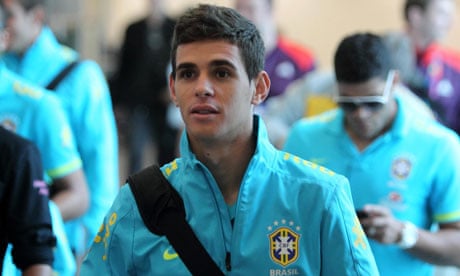Rafael da Silva puffs out his cheeks and gives the sort of gentle nod that advertises appreciation of the highest order. "He is the man," says the Brazil and Manchester United defender. Mano Menezes, the Brazil manager, reinforces the impression. "Put it this way," he says. "He wears the No10 for Brazil and we don't give that shirt out to just anybody."
At the beginning of this month there cannot have been many football fans in England familiar with Oscar dos Santos Emboaba Júnior. Chelsea have provided roughly 25 million reasons for that to have changed but the message from Oscar's Brazil Olympic colleagues is clear. The Premier League and the Chelsea support, in particular, can be very, very excited. When the transfer from Internacional is officially signed off, the London club will welcome a precocious talent.
"Chelsea's fans can expect a very intelligent player," Menezes says. "He is somebody that is able to read the game and solve any problems that arise for his team. He does not rush and dribble with the ball at this feet but he finds good things to do with the ball."
"The thing about Oscar," adds the Paris Saint-Germain and Brazil defender Thiago Silva, "is that he is a very calm guy, always with a smile on his face and never complaining about anything. He is the same on the pitch. He doesn't call much attention to himself, he is discreet but he is always very smart and intelligent."
The public on these shores is poised for its first glimpse of what the fuss is about. Oscar is part of an almost surreally gifted Brazil squad that is here with one thing in mind: to take home Olympic gold. It is a curiosity that Brazil, five times world champions, have never won the Olympic football tournament and it is something they fully intend to put right.
Menezes' likely starting XI is almost identical to the one he picks at full international level and that will carry Brazil's hopes at their World Cup in 2014. But it is a measure of the pressure that the manager is under that there is talk he will lose his job with the national team if he fails to impress in London.
The household names trip off his squad sheet, beginning with Neymar, Brazil's biggest star, who will play in Menezes' front three with Hulk and Leandro Damiao. Hulk is one of the three overage players; the others are Thiago Silva and Marcelo. Premier League fans will recognise Rafael and Tottenham Hotspur's Sandro. Pato, Ganso and Lucas Moura, the Manchester United target, are expected to be no more than substitutes.
"We are under huge pressure," Thiago Silva says, and Oscar, who will be charged with pulling the strings behind the forwards, might feel the burden more than most. In many respects the Brazilian public beyond Porto Alegre, where Inter are from, are only just waking up to Oscar. His profile is not enormous – it is dwarfed by that of Neymar, for example – as he has not made his name in Rio or Sao Paulo and his personality is not of the look-at-me variety. But Brazil will always have great expectations of its No10.
Oscar, though, is adept at taking things in his stride. This is a 20-year-old who has lived almost all of his professional life amid an extraordinary conflict, which saw him sue his first club, São Paulo, and endure two enforced breaks from the game. Oscar is a young man with admirable focus; lesser characters might not have made it to the other side.
Talk to Brazilians about the ownership battle that has coloured Oscar's story and they say that, if it is not entirely normal, then it is not unusual. But to English ears it confirms the perception of there being rather murky practices in south American football.
Oscar joined São Paulo at 13, where he made a name for himself in junior football before, briefly, forcing himself into the club's first team. But the problems started when, according to his agent Giuliano Bertolucci, São Paulo failed to pay the salary that they had promised. And so Oscar took them to court, before he walked out on them in December 2009.
In Brazil a player can become a free agent if he is not paid for three months and Oscar's representatives also argued that his contract was null and void as, in contravention of Fifa's rules, he had signed for more than three years when he was 16.
Oscar did not play until June 2010, when he joined Inter as a free agent but São Paulo continued to claim he belonged to them and they lodged legal appeals, which finally came to a head this year. The Brazil Sports Tribunal put a stop to Oscar playing for a period and he missed vital Copa Libertadores fixtures for Inter before, on 30 May, São Paulo announced that they had reached a settlement on his 'sale'. Oscar was cleared to play again.
There was a triumphal note about São Paulo's statement, which detailed a fee of 15m Reais (£4.75m), which represented a record between Brazilian clubs. But it is Inter who are laughing now, having found a way to pay São Paulo with the help of a third-party investor to turn round a massive profit with the Chelsea transfer. Inter's deal with São Paulo saw them take 50% of Oscar's rights, with the remainder being divvied up between Bertolucci, Oscar and the investor.
Oscar has much to look forward to in Chelsea blue yet it is tempting to speculate that the small things will feel golden, such as being paid on time and in full, and the knowledge that he will never be legally prevented from playing.
"Oscar has shown his strong character to get over various issues," Menezes says. "He is very mature and he has shown this with his determination to choose where he wanted to play. It shows how mature he is."
Oscar starred for Brazil at last year's Under-20 World Cup – he scored a hat-trick in the 3-2 victory over Portugal in the final – and, more recently, he has taken advantage of Ganso's injury problems to establish himself in Menezes' full international side. To date he has six caps.
People in Brazil laugh when the English pronounce Oscar. To them, it is Os-KA, with the emphasis on the final syllable. As in, Ulri-KA. There are smiles, too, among those who have followed him when they reflect on his journey from humble background in São Paolo to the brink of global superstardom.
"I've watched Oscar since his days at São Paulo," says TV Globo's Jon Cotterill, "and I'd describe him as the brains of the team. He has fabulous technique, good passing and vision but it's his ability to think quickly under pressure that marks him out."
Oscar will play in Brazil's Olympic warm-up fixture against Team GB at the Riverside Stadium on Friday night. His future is laced with tantalising possibilities.

